Are Japanese Games Better Than Western Ones?
 I think it’s no secret that, due to immense cultural differences, the Japanese and Western gaming markets operate very differently in both the way their games are made and the actual products that are released to the public. Japanese games tend to be more “out there”, more cartoony and colorful, often being released on handheld systems like the 3DS or Vita (sometimes exclusively, other times alongside a console release). They experiment more, and when you pick up a Japanese game, you know that what you’re getting may not always be good, but it’s certainly going to be interesting and unique in some way. Western games, on the other hand, tend to be a bit more formulaic, focused instead on pushing the envelope of technology. Bigger worlds, more realistic graphics, more weapons and modes and content! Western games tend to be rather similar in nature (for example, “Call of Duty: Advanced Warfare”, “Call of Duty: Black Ops III” and “Call of Duty: Infinite Warfare” are so similar that they’re almost indistinguishable), but each one is bigger and more advanced than the last.
I think it’s no secret that, due to immense cultural differences, the Japanese and Western gaming markets operate very differently in both the way their games are made and the actual products that are released to the public. Japanese games tend to be more “out there”, more cartoony and colorful, often being released on handheld systems like the 3DS or Vita (sometimes exclusively, other times alongside a console release). They experiment more, and when you pick up a Japanese game, you know that what you’re getting may not always be good, but it’s certainly going to be interesting and unique in some way. Western games, on the other hand, tend to be a bit more formulaic, focused instead on pushing the envelope of technology. Bigger worlds, more realistic graphics, more weapons and modes and content! Western games tend to be rather similar in nature (for example, “Call of Duty: Advanced Warfare”, “Call of Duty: Black Ops III” and “Call of Duty: Infinite Warfare” are so similar that they’re almost indistinguishable), but each one is bigger and more advanced than the last.
Up until now, the question of whether Western or Japanese games were better was purely a matter of preference. Some people enjoy brand new experiences – they like the quirky world, battle system and music of “The World Ends With You”, or the complete mindf*ckery of something like “Katamari Damacy”. Others prefer a more straightforward experience – a couple of matches of “Fifa” after work, or a new “Assassin’s Creed” game that gives you exactly what you expect from it. Nothing’s wrong with either approach, and over the years we’ve seen countless amazing games coming from both hemispheres. But something changed in 2017. A quick look at the top-rated games of the year shows that quite a few of them came from the East – way more than in previous years. “Breath of the Wild”, “Persona 5”, “Nier: Automata”, “Nioh”, “Resident Evil 7”, “Dragon Quest VIII”, “Yakuza 0” and many, many more games in the top charts came from Japan and not the West. That’s not to say that there weren’t any Western games found at all, with “Horizon: Zero Dawn” and the recently released “Prey” and “What Remains of Edith Finch” both finding a place near the top spot, but they’re definitely in the minority here.
So what’s happening? What changed? I feel like it has a lot to do with development cycles. In the West, games often have a set release date the moment they’re given the budget to start development, even if that release date isn’t always announced that early. Remember when in 2014 Marvel announced release dates for all of their movies going forward 5 years? Something similar happens with games, except it’s a lot less public, as games’ release dates tend to be a lot more finnicky and likely to be pushed back. However, games are also extremely expensive, and if a product is pushed back, it’s going to cause major setbacks to the developers, hitting them with heavy financial losses. The reason why so many games are released completely broken and then get fixed post-launch is precisely because some studios literally can not afford to not release a game when it’s scheduled, even if it doesn’t work. And then there’s the fact that in the West upper management often has more creative control over the games than the developers – they decide what gets released and what gets cut and sold as separate DLC, for example. The constant pressure of working long hours under a strict deadline while constantly taking into account executive meddling AND planning for the sequel all at once tends to drain many Western developers of their creativity.
Japan, on the other hand, does things a bit differently. For one, while in the West crunching for 10-12 hours in order to meet deadlines is considered an anomaly exclusive to game developers which tends to lower morale, in Japan extra long work days are common across the board, and even though they’re not particularly healthy, they’re considered the norm within that culture. In addition to that, while loose release windows are set, most Japanese companies tend to value creativity and a quality product over shipping something out the door as soon as humanly possible. While a Western developer like Activision absolutely needs a “Call of Duty” every single year to maximize profits, even if most of those games aren’t that great, Japanese developers are cool with waiting for an absurdly long time. The gap between “Final Fantasy XIII” and the next main single-player “Final Fantasy” title, XV, was eight years. The gap between “Persona 4” and “Persona 5” – also eight years. The gap between “Metal Gear Solid 4” and “Metal Gear Solid V”? Seven years. And probably the most famous example, the gap between “Shadow of the Colossus” and the studio’s next game, “The Last Guardian”, was eleven years. In the time it took Team ICO to create and release this one game, Ubisoft Montreal (just one of the numerous studios working under French publisher Ubisoft) released 44. And sure, some of these 44 games have been great, and it’s true that the developers have had help from other studios, but we’re lying to ourselves if we believe those games wouldn’t have been improved significantly if they were cut down in half.
But the thing is… Many studios can’t really afford to cut their workload in half. They need the revenue just to exist. Japan has a different standard than the US – if a Japanese game sells one million copies, it’s considered an astounding success, but if a Western game sells the same amount, depending on its budget, it may actually be considered a failure. Western developers need to release games constantly, and they need to be games that make money – even if they’re not necessarily good. If they don’t, they’ll just go the way of THQ and close their doors sooner or later. It’s lamentable, and the sad part is that there’s no real solution to this. Think about it – the best, most innovative Western games of the last few years are either indies with minimal budgets and not too much to lose or console exclusives where the console manufacturer foots the bill and allows the developers to get wild, because quality ships consoles. I don’t really see that changing, and as Western games keep pushing technology forward, game development will become more and more expensive and we’ll see Western games start taking less and less risks, hoping to appeal to the broadest demographic possible in order to sell. And don’t get me wrong, they’re probably still going to sell – by all accounts “Mass Effect Andromeda” is not a good game, released in a shoddy state and plagued by terrible writing and characterization, and yet it still managed to outsell “Nier: Automata”, one of the best action-RPGs ever made. Western games may be doomed to be inferior to their Japanese counterparts, but no matter what they will always sell better.

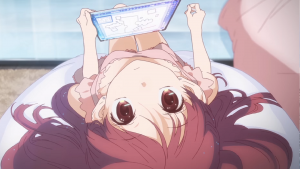 Yeah, guys. We’re talking about “Shelter” today. Everyone else that is even marginally connected to anime is doing it, so… Sure, why not? It’s not like I’m going to be original about it… And besides, I did discover it before it blew up! Hang on, let me put on that scarf and fedora I keep around here… Seriously though, the funny story about “Shelter” is that I actually discovered it through the YouTube algorithm when it only had a little over a thousand views, and I sent it to a bunch of friends telling them “Holy crap, you guys totally need to watch this”, and of course not a single one of them watched it. And later on, when everyone and their mother realized that “Shelter” is one of the best animated music videos of all time,
Yeah, guys. We’re talking about “Shelter” today. Everyone else that is even marginally connected to anime is doing it, so… Sure, why not? It’s not like I’m going to be original about it… And besides, I did discover it before it blew up! Hang on, let me put on that scarf and fedora I keep around here… Seriously though, the funny story about “Shelter” is that I actually discovered it through the YouTube algorithm when it only had a little over a thousand views, and I sent it to a bunch of friends telling them “Holy crap, you guys totally need to watch this”, and of course not a single one of them watched it. And later on, when everyone and their mother realized that “Shelter” is one of the best animated music videos of all time,  Next year, we’ll actually be getting not one, but two major Hollywood productions based on anime series – “Ghost in the Shell”, starring Scarlett Johansson, and “Death Note”, starring Nat Wolff. Both adaptations have been trying to get off the ground for a really long time now (“The Matrix” was originally supposed to be a “Ghost in the Shell” adaptation, but the Wachowskis didn’t think they’d get the rights, so they took some main themes and styles and presented them in their own way, while “Death Note” had a failed adaptation with Zac Efron, which was a real shame because Zac Efron is literally Kira), so I’m actually really excited to see how they turn out! You already know that
Next year, we’ll actually be getting not one, but two major Hollywood productions based on anime series – “Ghost in the Shell”, starring Scarlett Johansson, and “Death Note”, starring Nat Wolff. Both adaptations have been trying to get off the ground for a really long time now (“The Matrix” was originally supposed to be a “Ghost in the Shell” adaptation, but the Wachowskis didn’t think they’d get the rights, so they took some main themes and styles and presented them in their own way, while “Death Note” had a failed adaptation with Zac Efron, which was a real shame because Zac Efron is literally Kira), so I’m actually really excited to see how they turn out! You already know that  While “Kill la Kill” is definitely a very “love it or hate it” kind of show, in the same vein as “Attack on Titan”, it served the purpose of putting its creator, studio Trigger, on the map, and making them one of the most recognizable names in anime. As such, when it was announced that they were working on a new anime that would air for a 12-episode run in 2012, you can bet that all eyes were on it as the starved fans waited to dig their teeth into whatever weird-but-deeper-than-expected adventure they’d be presented with next. Upon its release, “Kiznaiver” immediately became the stand-out anime of the season, with many praising its premise and characters before quickly… forgetting all about it and moving on to other things. Surprisingly, “Kiznaiver” neither became a classic nor was despised by fans, so… Is it good, or is it bad? Let’s get to the bottom of it together!
While “Kill la Kill” is definitely a very “love it or hate it” kind of show, in the same vein as “Attack on Titan”, it served the purpose of putting its creator, studio Trigger, on the map, and making them one of the most recognizable names in anime. As such, when it was announced that they were working on a new anime that would air for a 12-episode run in 2012, you can bet that all eyes were on it as the starved fans waited to dig their teeth into whatever weird-but-deeper-than-expected adventure they’d be presented with next. Upon its release, “Kiznaiver” immediately became the stand-out anime of the season, with many praising its premise and characters before quickly… forgetting all about it and moving on to other things. Surprisingly, “Kiznaiver” neither became a classic nor was despised by fans, so… Is it good, or is it bad? Let’s get to the bottom of it together! Hey, remember how last time I said I was going to go into some articles about fan-favorite franchise “Shin Megami Tensei: Persona” (which I’m going to refer to from now on simply as “Persona” in an attempt to shave off a couple hundred words from having to constantly write the full names of the games)? Well, here I am, ready to keep my promise! While “Shin Megami Tensei” is still kind of a niche franchise that only JRPG aficionados have any real interest in, its “Persona” spinoff has grown into a cultural phenomenon. Nobody thought that a game that is so deeply rooted in Japanese culture, philosophy and mythology could be successful worldwide – in fact, when released overseas, the first “Persona” was majorly overhauled for an American audience, with changed names and locales to make it more Western. Neither the first nor second games were really big hits on the original PlayStation, but when “Persona 3” hit on PS2… Boy oh boy.
Hey, remember how last time I said I was going to go into some articles about fan-favorite franchise “Shin Megami Tensei: Persona” (which I’m going to refer to from now on simply as “Persona” in an attempt to shave off a couple hundred words from having to constantly write the full names of the games)? Well, here I am, ready to keep my promise! While “Shin Megami Tensei” is still kind of a niche franchise that only JRPG aficionados have any real interest in, its “Persona” spinoff has grown into a cultural phenomenon. Nobody thought that a game that is so deeply rooted in Japanese culture, philosophy and mythology could be successful worldwide – in fact, when released overseas, the first “Persona” was majorly overhauled for an American audience, with changed names and locales to make it more Western. Neither the first nor second games were really big hits on the original PlayStation, but when “Persona 3” hit on PS2… Boy oh boy. 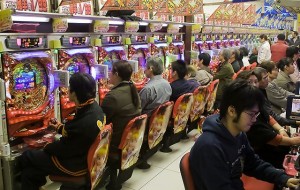 Okay, people, we’re taking a little bit of a break from our usual anime and anime-inspired topics for a little bit in order to dive a little bit into Japanese culture! I promise that I’ve got plenty of anime-themed posts for you to enjoy (including, but not limited to, a review of “Kiznaiver”, the new anime from the folks behind “Kill La Kill”, and a multi-part retrospective of the “Persona” franchise), but for now I’d like to focus on something a bit different which I regardless find quite interesting, and somewhat relevant to our interests. If you’re strictly interested in my anime thoughts, then feel free to stop reading and wait for my next article, but if you’re fascinated by Japanese culture, then keep on reading! In particular, we’re going to be talking about pachinko machines, which have been a staple of Japanese arcades since the 1920s and have become a big part of the country’s identity, with entire pachinko parlors popping up in numerous cities hosting nothing but dozens upon dozens of pachinko machines. Since gambling, in most of its forms, is strictly prohibited in Japan, pachinko is the closest that most people get to real gambling. It’s actually an ingenious system that has been created by someone deserving of a whole lot more credit than they actually got – when you play pachinko, you earn tickets that you can exchange for prizes. Next to most parlors are entirely separate businesses that will buy those prizes back for cash, so as a result you’re pretty much gambling without breaking any of Japan’s strict laws. Brilliant!
Okay, people, we’re taking a little bit of a break from our usual anime and anime-inspired topics for a little bit in order to dive a little bit into Japanese culture! I promise that I’ve got plenty of anime-themed posts for you to enjoy (including, but not limited to, a review of “Kiznaiver”, the new anime from the folks behind “Kill La Kill”, and a multi-part retrospective of the “Persona” franchise), but for now I’d like to focus on something a bit different which I regardless find quite interesting, and somewhat relevant to our interests. If you’re strictly interested in my anime thoughts, then feel free to stop reading and wait for my next article, but if you’re fascinated by Japanese culture, then keep on reading! In particular, we’re going to be talking about pachinko machines, which have been a staple of Japanese arcades since the 1920s and have become a big part of the country’s identity, with entire pachinko parlors popping up in numerous cities hosting nothing but dozens upon dozens of pachinko machines. Since gambling, in most of its forms, is strictly prohibited in Japan, pachinko is the closest that most people get to real gambling. It’s actually an ingenious system that has been created by someone deserving of a whole lot more credit than they actually got – when you play pachinko, you earn tickets that you can exchange for prizes. Next to most parlors are entirely separate businesses that will buy those prizes back for cash, so as a result you’re pretty much gambling without breaking any of Japan’s strict laws. Brilliant!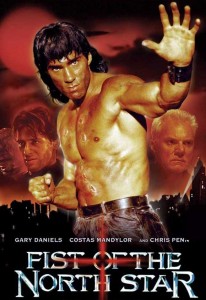 Attack on Titan. Higurashi No Naku Koro Ni. DragonBall. Three beloved anime series that many consider to be among the best. You know what else connects them? All three were adapted into live action movies, and all three (well, five, technically – “Attack on Titan” and “Higurashi” were split into two parts) of those movies were absolute garbage. “The Guyver”, “Devilman”, “Hokuto no Ken”, “Usagi Drop” and many, many, many more examples released over the years just continue to prove, over and over again, that neither Hollywood nor Japanese filmmakers have any idea how to take an anime series and adapt it into live action properly. I mean, sure, there have been a handful of successes, such as “Death Note” and “Ruroni Kenshin”, but those are very few and very far in between. And with “Ghost in the Shell”, “Akira” and the
Attack on Titan. Higurashi No Naku Koro Ni. DragonBall. Three beloved anime series that many consider to be among the best. You know what else connects them? All three were adapted into live action movies, and all three (well, five, technically – “Attack on Titan” and “Higurashi” were split into two parts) of those movies were absolute garbage. “The Guyver”, “Devilman”, “Hokuto no Ken”, “Usagi Drop” and many, many, many more examples released over the years just continue to prove, over and over again, that neither Hollywood nor Japanese filmmakers have any idea how to take an anime series and adapt it into live action properly. I mean, sure, there have been a handful of successes, such as “Death Note” and “Ruroni Kenshin”, but those are very few and very far in between. And with “Ghost in the Shell”, “Akira” and the 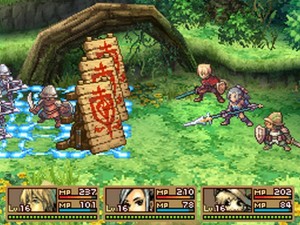 Quick! Name the best Japanese RPG you’ve ever played! No, no, don’t think about it, just say the first thing that comes into your mind. “Final Fantasy VII”? “Persona 4”? “Secret of Mana”? Ha, you know nothing, Jon Snow! Everybody knows that “Final Fantasy VI”, “Persona 3” and “Adventures of Mana” are the superior games! Seriously though, when it comes to JRPGs in particular, there’s usually a couple of titles or series that seem to pop up on everyone’s radars, whether it’s because they grew up with them (like “Chrono Trigger”), because they discovered them and realized they’re consistently good (like the “Tales” series) or because, well, they’re just really, really great (like “Xenoblade Chronicles”). However, there’s just as many awesome JRPGs that you may not have heard of, yet still deserve your attention! Today we’re gonna do something a little bit different and, rather than talk about anime, we’re going to be talking about games inspired by anime! Sound good? Alright, let’s get cracking!
Quick! Name the best Japanese RPG you’ve ever played! No, no, don’t think about it, just say the first thing that comes into your mind. “Final Fantasy VII”? “Persona 4”? “Secret of Mana”? Ha, you know nothing, Jon Snow! Everybody knows that “Final Fantasy VI”, “Persona 3” and “Adventures of Mana” are the superior games! Seriously though, when it comes to JRPGs in particular, there’s usually a couple of titles or series that seem to pop up on everyone’s radars, whether it’s because they grew up with them (like “Chrono Trigger”), because they discovered them and realized they’re consistently good (like the “Tales” series) or because, well, they’re just really, really great (like “Xenoblade Chronicles”). However, there’s just as many awesome JRPGs that you may not have heard of, yet still deserve your attention! Today we’re gonna do something a little bit different and, rather than talk about anime, we’re going to be talking about games inspired by anime! Sound good? Alright, let’s get cracking!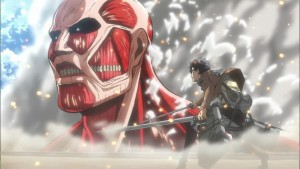 In 2013, the anime series “Attack on Titan” hit the world by storm, creating one of the biggest anime hits of all time. Come on, don’t pretend – if you’re here you know about it! Practically every single anime convention ever since 2013 has had at least one member of the Survey Corps among its ranks of cosplayers, and even today, in early 2016, the Internet is STILL buzzing with discussions about it! Hell, the anime was so successful that even the creators didn’t expect it to grow THAT big, which is why today, 3 years later, the second season is still in development. That didn’t stop the Japanese movie machine from releasing two live action movies of dubious quality, several animated features with footage from the show and, of course, countless ads featuring the titular Titans. And after playing numerous videogames based on the franchise, the latest of which (titled simply “Attack on Titan”) released weeks ago in Japan, I can’t help but stop and ask myself… Why? Why is this anime so unbelievably popular, to the point where it has overshadowed everything else released in the last 3 years? Let’s take a closer look.
In 2013, the anime series “Attack on Titan” hit the world by storm, creating one of the biggest anime hits of all time. Come on, don’t pretend – if you’re here you know about it! Practically every single anime convention ever since 2013 has had at least one member of the Survey Corps among its ranks of cosplayers, and even today, in early 2016, the Internet is STILL buzzing with discussions about it! Hell, the anime was so successful that even the creators didn’t expect it to grow THAT big, which is why today, 3 years later, the second season is still in development. That didn’t stop the Japanese movie machine from releasing two live action movies of dubious quality, several animated features with footage from the show and, of course, countless ads featuring the titular Titans. And after playing numerous videogames based on the franchise, the latest of which (titled simply “Attack on Titan”) released weeks ago in Japan, I can’t help but stop and ask myself… Why? Why is this anime so unbelievably popular, to the point where it has overshadowed everything else released in the last 3 years? Let’s take a closer look. As some of you may already know, I’m actually a pretty big fan of online casino games, slots in particular. It’s not something that I obsess over religiously (you know, like anime), but it’s still an activity that I absolutely adore. The few of you who already know about it have probably read
As some of you may already know, I’m actually a pretty big fan of online casino games, slots in particular. It’s not something that I obsess over religiously (you know, like anime), but it’s still an activity that I absolutely adore. The few of you who already know about it have probably read  When you ask somebody who’s not really all that interested into anime to cite a couple of anime films, the responses are always the same. “Akira”, “Ghost in the Shell”, “Spirited Away”… But a lot of people will also mention another movie by the name of “Paprika”. While most anime movies don’t receive a wide release outside of Japan, “Paprika” did, and it’s very easy to see why – its stellar animation, mindbending visuals and story that’s confusing in all the right ways made it a hit in Japan, and won it a moderate success outside of it, which is about as much as anime movies can enjoy, really. “Paprika” is a very interesting case within the anime industry because its director, Satoshi Kon, has never actually made a bad movie. Not only that – he’s never made anything that hasn’t been absolutely and completely stellar. From “Perfect Blue”, which inspired a generation of Hollywood directors, through the brilliant “Millennium Actress” which showed the world how a character-driven historical drama was supposed to be made, to the amazing “Tokyo Godfathers” which is, by far, the best Christmas movie I’ve ever seen despite coming from a culture that celebrates Christmas by eating lots of KFC. His movies could be terrifying, but they could also be quirky and hilarious when they wanted, but most importantly, they consistently pushed the boundaries of what could be done with anime and animation in general as a medium. Still, I believe that none of his works give us a better look inside Satoshi Kon’s mind than his first and only foray into serialized anime, “Paranoia Agent”.
When you ask somebody who’s not really all that interested into anime to cite a couple of anime films, the responses are always the same. “Akira”, “Ghost in the Shell”, “Spirited Away”… But a lot of people will also mention another movie by the name of “Paprika”. While most anime movies don’t receive a wide release outside of Japan, “Paprika” did, and it’s very easy to see why – its stellar animation, mindbending visuals and story that’s confusing in all the right ways made it a hit in Japan, and won it a moderate success outside of it, which is about as much as anime movies can enjoy, really. “Paprika” is a very interesting case within the anime industry because its director, Satoshi Kon, has never actually made a bad movie. Not only that – he’s never made anything that hasn’t been absolutely and completely stellar. From “Perfect Blue”, which inspired a generation of Hollywood directors, through the brilliant “Millennium Actress” which showed the world how a character-driven historical drama was supposed to be made, to the amazing “Tokyo Godfathers” which is, by far, the best Christmas movie I’ve ever seen despite coming from a culture that celebrates Christmas by eating lots of KFC. His movies could be terrifying, but they could also be quirky and hilarious when they wanted, but most importantly, they consistently pushed the boundaries of what could be done with anime and animation in general as a medium. Still, I believe that none of his works give us a better look inside Satoshi Kon’s mind than his first and only foray into serialized anime, “Paranoia Agent”. For the next few blog posts, I decided to switch things up a bit on the blog! I’m usually talking about anime series from the 80s which are directly related to Saint Seiya, in some way, and by “directly related” I mean they’re Hokuto no Ken. Well, even though I’d never get sick of writing about Seiya and Hokuto, but I’m fairly certain you guys might get sick of reading about them if I don’t mix things up, so why don’t we fast forward a bit in the timeline and talk about some current anime that I’d recommend? At the end of the day, while 80s anime had a certain charm to it, anime from the last 10 years is also pretty darn great!
For the next few blog posts, I decided to switch things up a bit on the blog! I’m usually talking about anime series from the 80s which are directly related to Saint Seiya, in some way, and by “directly related” I mean they’re Hokuto no Ken. Well, even though I’d never get sick of writing about Seiya and Hokuto, but I’m fairly certain you guys might get sick of reading about them if I don’t mix things up, so why don’t we fast forward a bit in the timeline and talk about some current anime that I’d recommend? At the end of the day, while 80s anime had a certain charm to it, anime from the last 10 years is also pretty darn great! “Saint Seiya”, just like pretty much every huge anime franchise, has seen a ton of videogames based on it. Starting with “Saint Seiya: The Sanctuary” ten years ago on the now archaic PS2, the franchise has seen three more games based on it, with the latest, “Soldier’s Soul”, being released only a few months ago on the PS3, PS4 and, rather surprisingly, PC. While this may seem shocking, it’s really not – as I said, most big franchises of fighting anime have gotten plenty of games, including “Hokuto no Ken” (no, I’ll never stop talking about it on this blog, so sue me), “Bleach”, “Naruto”, “DragonBall” and so on and so forth. And admittedly, most licensed games haven’t been very good. Essentially, if you’ve played one of them, you’ve pretty much played all of them – they’re all 3D fighters with lots of flashy special attacks that play exactly the same way. “Ultimate Ninja Storm” is exactly like “Heat the Soul” which is exactly like “Dragonball Xenoverse”, minus a few differences.
“Saint Seiya”, just like pretty much every huge anime franchise, has seen a ton of videogames based on it. Starting with “Saint Seiya: The Sanctuary” ten years ago on the now archaic PS2, the franchise has seen three more games based on it, with the latest, “Soldier’s Soul”, being released only a few months ago on the PS3, PS4 and, rather surprisingly, PC. While this may seem shocking, it’s really not – as I said, most big franchises of fighting anime have gotten plenty of games, including “Hokuto no Ken” (no, I’ll never stop talking about it on this blog, so sue me), “Bleach”, “Naruto”, “DragonBall” and so on and so forth. And admittedly, most licensed games haven’t been very good. Essentially, if you’ve played one of them, you’ve pretty much played all of them – they’re all 3D fighters with lots of flashy special attacks that play exactly the same way. “Ultimate Ninja Storm” is exactly like “Heat the Soul” which is exactly like “Dragonball Xenoverse”, minus a few differences.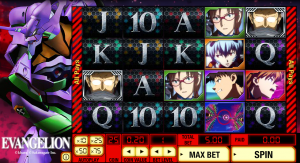 I’ve got to admit – I’m not the biggest gambler around. I don’t really like to play casino games, mostly because I’m really, really bad at them. No matter what I do I can’t seem to win at card games. I’m a dud at poker even when I think I’ve got good cards, and I’ve never won more than I’ve lost at blackjack. I do, however, quite like slots. There’s something awfully relaxing about watching the reels spin, and in the Internet age you don’t even need to go to a casino in order to play some great slots! Since I’m a huge anime fan, I recently decided to try and track down some anime slots… And boy, oh boy, was I disappointed!
I’ve got to admit – I’m not the biggest gambler around. I don’t really like to play casino games, mostly because I’m really, really bad at them. No matter what I do I can’t seem to win at card games. I’m a dud at poker even when I think I’ve got good cards, and I’ve never won more than I’ve lost at blackjack. I do, however, quite like slots. There’s something awfully relaxing about watching the reels spin, and in the Internet age you don’t even need to go to a casino in order to play some great slots! Since I’m a huge anime fan, I recently decided to try and track down some anime slots… And boy, oh boy, was I disappointed! Saint Seiya‘s popularity can be explained relatively easily – it was a very well-made manga that appealed to a large demographic and rode an already very high wave. But that wave was started by Hokuto – while there have been violent martial arts manga before, it was Hokuto that solidified the genre. But why? How come so many people fell in love with it? Sure, it was good, but there have been plenty of great manga over the years, and very few have endured the way Hokuto has. What is its secret? After all, on paper the concept sounds absolutely terrible – a boring guy who’s the best at everything going around a bland desert and solving everyone’s problems? No way that can ever go anywhere! And yes, in a way you’d make some pretty valid points, but the true strength of Hokuto aren’t its world, characters or story. It’s how they are all presented within the narrative. Let’s take a closer look at the manga’s very first chapter and see what we can get from it!
Saint Seiya‘s popularity can be explained relatively easily – it was a very well-made manga that appealed to a large demographic and rode an already very high wave. But that wave was started by Hokuto – while there have been violent martial arts manga before, it was Hokuto that solidified the genre. But why? How come so many people fell in love with it? Sure, it was good, but there have been plenty of great manga over the years, and very few have endured the way Hokuto has. What is its secret? After all, on paper the concept sounds absolutely terrible – a boring guy who’s the best at everything going around a bland desert and solving everyone’s problems? No way that can ever go anywhere! And yes, in a way you’d make some pretty valid points, but the true strength of Hokuto aren’t its world, characters or story. It’s how they are all presented within the narrative. Let’s take a closer look at the manga’s very first chapter and see what we can get from it!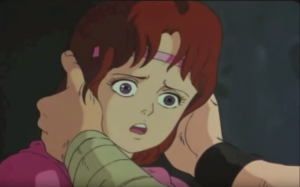 It’d be so easy to introduce Kenshiro in the middle of battle, kicking ass and taking names. Hell, that’s how a lot of manga introduce their protagonists in order to show just how badass they are. In fact, a lot of movies and videogames do the same, starting with a high-action scene to catch the viewer’s attention and establish the main character’s fighting prowess. But that’s not what Kenshiro is about. Sure, he can make your head explode with a punch, but he has never been defined by his fighting ability, and Hokuto wants you to know it. While we do see the results of one of his rampages, we never see him actually fighting anyone. Instead, we see him stumble into a village exhausted and dehydrated. This is another important lesson about our protagonist – he’s not an all-powerful god. While he does possess immeasurable martial arts skills, he’s still very much human and is subject to the very same weaknesses that the average human is. Mistaking him for a bandit, the villagers quickly lock him up alongside an actual bandit – Bat, a young boy who grew up in the midst of the apocalypse and had to learn to survive in it. When Bat attempts to assault their warden – an 8 year old mute girl by the name of Rin, who was trying to bring them some water – Kenshiro not only refuses to help him, but actually pushes a pressure point on his arm to make him let go of Rin. When asked why he would sacrifice his freedom like this, Kenshiro merely responds with “What do you think would’ve happened to the girl had we escaped?” Placing innocent lives before his own has always been one of the character traits that has truly defined Kenshiro. Soon afterwards, we see him use his knowledge of pressure points to cure Rin of her muteness. This is the very first time we’ve seen him use his devastating powers… and it is to help a child speak.
It’d be so easy to introduce Kenshiro in the middle of battle, kicking ass and taking names. Hell, that’s how a lot of manga introduce their protagonists in order to show just how badass they are. In fact, a lot of movies and videogames do the same, starting with a high-action scene to catch the viewer’s attention and establish the main character’s fighting prowess. But that’s not what Kenshiro is about. Sure, he can make your head explode with a punch, but he has never been defined by his fighting ability, and Hokuto wants you to know it. While we do see the results of one of his rampages, we never see him actually fighting anyone. Instead, we see him stumble into a village exhausted and dehydrated. This is another important lesson about our protagonist – he’s not an all-powerful god. While he does possess immeasurable martial arts skills, he’s still very much human and is subject to the very same weaknesses that the average human is. Mistaking him for a bandit, the villagers quickly lock him up alongside an actual bandit – Bat, a young boy who grew up in the midst of the apocalypse and had to learn to survive in it. When Bat attempts to assault their warden – an 8 year old mute girl by the name of Rin, who was trying to bring them some water – Kenshiro not only refuses to help him, but actually pushes a pressure point on his arm to make him let go of Rin. When asked why he would sacrifice his freedom like this, Kenshiro merely responds with “What do you think would’ve happened to the girl had we escaped?” Placing innocent lives before his own has always been one of the character traits that has truly defined Kenshiro. Soon afterwards, we see him use his knowledge of pressure points to cure Rin of her muteness. This is the very first time we’ve seen him use his devastating powers… and it is to help a child speak.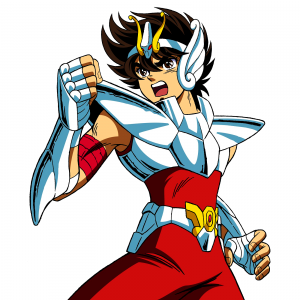 Let me take you back to early 80s Japan. The country’s economy is in a boom – the highest point since the war, with an average of 4% growth per year throughout the decade. Unemployment is at less than 5%. Japanese people suddenly found themselves with a lot of disposable income, which led to a natural increase in entertainment products, such as movies and comic books. Additionally, videogames such as Donkey Kong and Super Mario Bros. gain Japan worldwide recognition, forever sealing its place as the premier developer of videogames – a position that it would hold for at least the next 20 years, and arguably for a lot more. But there was another character created around the same time who, while not nearly as popular as Mario, proved to be just as influential. His name… is Kenshiro.
Let me take you back to early 80s Japan. The country’s economy is in a boom – the highest point since the war, with an average of 4% growth per year throughout the decade. Unemployment is at less than 5%. Japanese people suddenly found themselves with a lot of disposable income, which led to a natural increase in entertainment products, such as movies and comic books. Additionally, videogames such as Donkey Kong and Super Mario Bros. gain Japan worldwide recognition, forever sealing its place as the premier developer of videogames – a position that it would hold for at least the next 20 years, and arguably for a lot more. But there was another character created around the same time who, while not nearly as popular as Mario, proved to be just as influential. His name… is Kenshiro.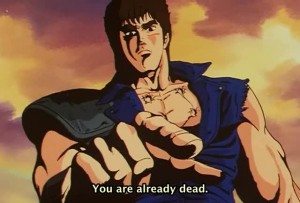 Hokuto‘s popularity gave rise to martial arts mangas that followed the same formula. Numerous attempts were made, some successful (such as 1984’s DragonBall) and some not. One of those attempts was Saint Seiya, created by Masami Kurumada. While not a direct ripoff of Hokuto, the influences were obvious – Saint Seiya also had a highly masculine protagonist (though more emotionally than physically) who used martial arts to right wrongs. But there were also several differences – for example, instead of a desolate wasteland, the Saints (Saint Seiya‘s word for martial artist) fought in a world that mixed sci-fi and Greek mythology settings, and instead of a sole protagonist wandering with a small supporting cast that mostly cheer him on, main character Seiya was joined by four other Saints. But there was another extremely important difference, one that I believe helped elevate Saint Seiya above the status as “just another martial arts” manga. While Hokuto no Ken was aimed at adults, with hyper-violence, complex themes and often depressing or bittersweet endings, and DragonBall was unquestionably aimed at little boys, with a child protagonist, simple plots and unquestionably evil bad guys, Saint Seiya managed to hit the tonal middle ground in order to appeal to almost everyone.
Hokuto‘s popularity gave rise to martial arts mangas that followed the same formula. Numerous attempts were made, some successful (such as 1984’s DragonBall) and some not. One of those attempts was Saint Seiya, created by Masami Kurumada. While not a direct ripoff of Hokuto, the influences were obvious – Saint Seiya also had a highly masculine protagonist (though more emotionally than physically) who used martial arts to right wrongs. But there were also several differences – for example, instead of a desolate wasteland, the Saints (Saint Seiya‘s word for martial artist) fought in a world that mixed sci-fi and Greek mythology settings, and instead of a sole protagonist wandering with a small supporting cast that mostly cheer him on, main character Seiya was joined by four other Saints. But there was another extremely important difference, one that I believe helped elevate Saint Seiya above the status as “just another martial arts” manga. While Hokuto no Ken was aimed at adults, with hyper-violence, complex themes and often depressing or bittersweet endings, and DragonBall was unquestionably aimed at little boys, with a child protagonist, simple plots and unquestionably evil bad guys, Saint Seiya managed to hit the tonal middle ground in order to appeal to almost everyone.